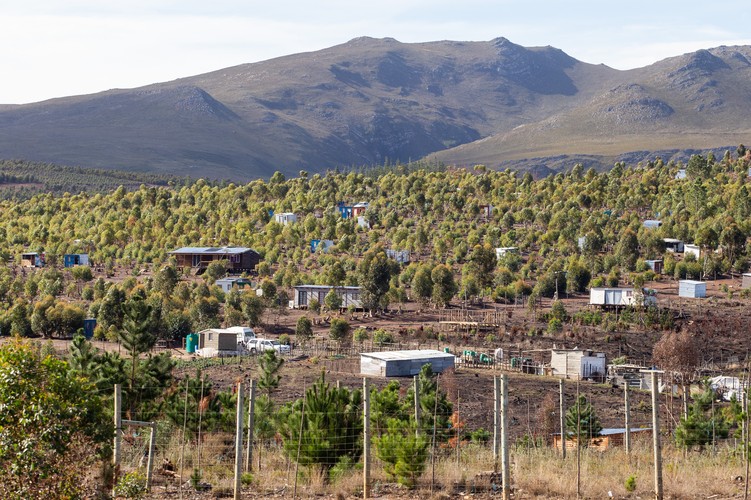
12 September 2022
First occupied in November 2020 in order to establish a self-sustaining “sovereign Khoisan community”, Knoflokskraal near Grabouw in the Western Cape has now attracted thousands of people. Archive photo: Ashraf Hendricks
The Department of Forestry, Fisheries and the Environment (DFFE) has confirmed to GroundUp that the occupiers of the Khoisan settlement in Grabouw, known as Knoflokskraal, will soon be facing eviction. The land, located in the Elgin Valley, belongs to the Department of Public Works and it is managed by the DFFE.
DFFE spokesperson Albi Modise said the department would “like to proceed with evictions” but is awaiting feedback from the public works department on whether it will support the court process.
In November 2020, only a few people settled on the land with the purpose of reclaiming it. Since then the occupation has grown significantly. Modise said that the department offered alternative land for human settlement on condition that the residents relocate, noting that the land is part of the Kogelberg Biosphere and of “environmental importance”.
Currently 1,800 hectares of the land are under a containment court order, meaning that no residents are allowed to move onto or build further on the property.
Andy Wynand, resident at Knoflokskraal, said they want the containment order removed, and they want to begin negotiating to have the land handed over to the community.
Andy Wynand told a crowd in July that they are going to work hard to have the containment order from the Western Cape High Court removed. Photo: Ashraf Hendricks
On 30 July, about 150 people from the community gathered for a meeting close to the entrance of Knoflokskraal where Wynand addressed the crowd about the future of the occupation.
Wynand told GroundUp that they are now looking into a process of mediation with Public Works, the DFFE, and the Theewaterskloof Municipality.
Cornelis van der Waal, CEO of the Grabouw Development Agency (GDA), also spoke to the occupiers, saying the community had to establish a leadership and develop a proper plan for the land, and then take it to government and try to do a mediation process outside of court.
We previously reported on Knoflokskraal leadership wanting to establish a sovereign Khoisan community on the occupied land. Residents said that they are reclaiming the land based on their rights as indigenous Khoisan people.
But Wynand said that the current leaders of the occupation are “not coming to the table” and “not willing to accept certain things”. He said the leadership “could never reach a consensus on what they wanted” and that the occupation “kept on walking away from mediation”.
“We received a mandate from the community to take their interests further with the negotiation process,” Wynand said. He said that community representatives have in the meantime also met with the Theewaterskloof Municipality.
GroundUp sent questions to the municipality asking about its involvement in the negotiation process, whether it will support the eviction proceedings, and whether it has considered providing water and sanitation services to the residents. But the municipal manager, Boy Manqoba Ngubo, did not respond to follow-ups despite saying they would “respond in the coming days”.
Knoflokskraal resident Lamees Claasen told GroundUp that the eviction proceedings are not “fair” on them. Claasen and her husband moved from Rocklands in Mitchells Plain to Knoflokskraal over a year ago. She said it was a sense of relief moving from an area that is quite dangerous. Even though they do struggle, she said they find Knoflokskraal “quiet”, “peaceful” and “comforting”.
She said that it’s necessary for everybody in the occupation to come together and for them not to be so divided.
On Tuesday, the DFFE will be briefing the National Assembly on the investigation into the “organised land invasions” at the Khoisan occupation in Knoflokskraal.